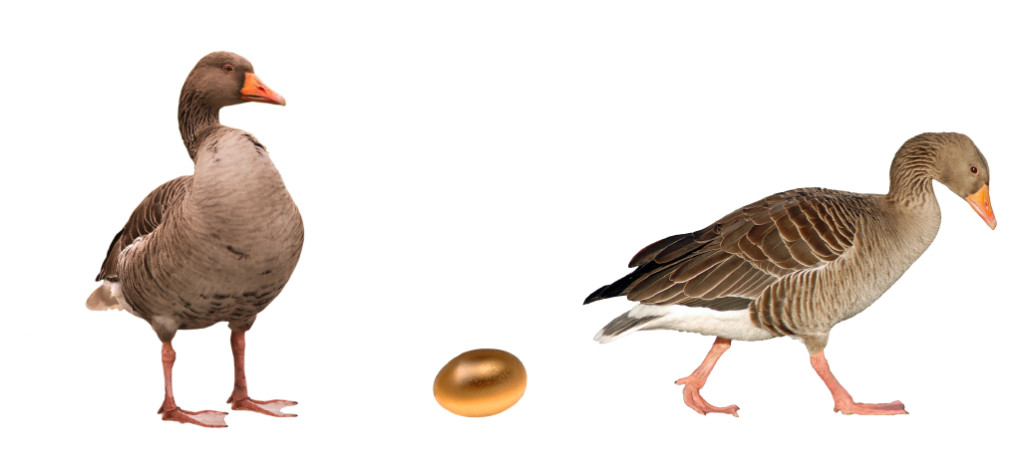Raising Golden Eggs

I was just two months shy of my 16th birthday when I found myself hanging from a balcony 20 feet off the ground with a half dozen strangers below holding a fireman’s net yelling for me to jump. I leaned back, closed my eyes and let go.
Now I wasn’t jumping for my life, it was the opening event of a “Father and Teens Wilderness Experience” put on by Brigham Young University (BYU). After a few more harrowing activities, my dad, younger sister and I were given a can of root beer and an orange as we boarded a bus from campus to the Uinta Mountains. Turned out that this was all we would get to eat until we got another orange the following morning – after a 14 mile overnight march to camp. The next couple of days were filled with confidence and team building activities like a ropes course, rappelling off a cliff and pit roasting an old sheep that we killed and dressed. None of this was in the promotional brochure, by the way.
For me, one of the highlights of the experience was our guest “speaker”, the late Dr. Stephen Covey. Dr. Covey, then a professor at BYU, brought his son Sean along on the trip and conducted several breakout sessions for the group on topics like relationships, spiritual growth and charting a course in life. Of course, he went on to author “7 Habits of Highly Effective People” and to develop an entire program that has benefited millions of people worldwide. I’ve been fortunate to have participated in Covey’s training at two companies for which I’ve worked.
We all realize that success comes from doing the right things; the most important things. The problem is that we get so busy working in our businesses, that we don’t take time to prioritize all that activity and make sure we get done the things that will provide the best long-term results.
Stephen Covey taught us to distinguish Importance from Urgency using a chart like this one. For example, a ringing telephone is urgent. It makes noise and is hard to ignore. Is the call important? Maybe yes, maybe no: we’ll find out when we answer it. How about getting Mrs. Jones’ alternator replaced as promised by 5? That’s important and urgent.

So what do we end up doing?
- We have no problem eliminating things that are unimportant and not urgent
- Things that are both important and urgent are no brainers – just do them
- We tend to end up doing unimportant things that are urgent just get them out of our life
- What most often gets left undone are things that ARE important, but not urgent – for most of us, thinking about and focusing on this quadrant will deliver big results
For example, the AutoNetTV production department has more custom work to do in the first six months of this year than it had in the previous two years combined. These are all Quadrant II projects – they’re important and they have deadlines. But what about other activities like marketing support and research? Obviously they are important: marketing today means sales tomorrow. Today’s research will lead to the future products and services we will create and offer. These are the things that determine our long term success; but with no outside deadlines, these vital pursuits can end up postponed indefinitely.
Dr. Covey reinforced this with the concept of taking care of the Goose that Lays the Golden Eggs. If we neglect to feed and nurture the goose (our business) because we are too focused on the golden eggs (fixing cars, creating videos, etc.) the goose will suffer, be less competitive and eventually could cease laying eggs at all.
I suggest setting aside time at least once a month to look at those Quadrant I issues: Identify them; make a plan to address them yourself or delegate or automate (perhaps your in-store marketing could be automated with an AutoNetTV Digital Menu Board – just saying) and schedule time to get it done. You’ll be surprised how it really won’t slow down your Quadrant II priorities. And the focus on Quadrant I will give you a quantum boost.
One last Dr. Covey story: One of our activities was to cross the Strawberry River, raging at near flood stage from early summer run-off, on a single rope stretched across the river. The idea was to crawl along the top of the rope to conserve energy. Of course only a couple guys were coordinated enough to pull that off – the rest of us slid around and were hanging by our hands and ankles. It was really hard and dangerous. Half way back, Dr. Covey was struggling. He tipped his head back, looking upside down at us cheering him on from the bank and yelled, “P.H.D. – help me now!”
Lance Boldt is Vice President and Co-Founder of AutoNetTV. AutoNetTV’s digital signage products deliver entertaining and educational TV programming to the lobbies of automotive service and repair businesses as well as digital menu boards and automotive website video content.
